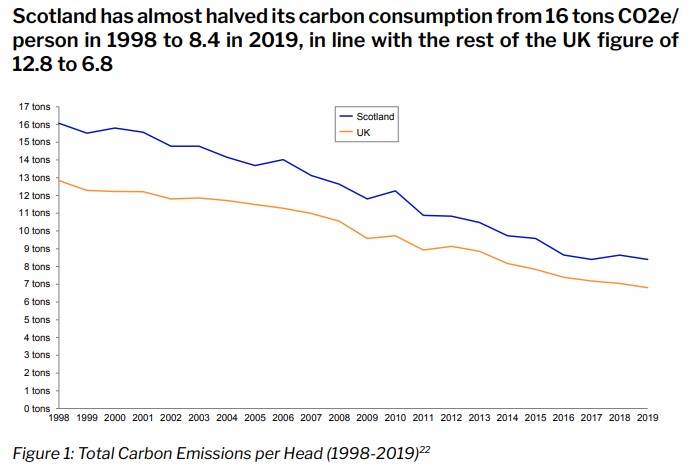Dr Peter Wood | Twitter
Dr Peter Wood is an Associate Lecturer in Environmental Science, Studies and Management at The Open University in Scotland.
There’s nothing stopping Scotland from having lower energy bills and a carbon neutral future. To do so, we to need reform Britain’s energy union - not end it.
Scotland’s renewable power needs to be anchored in the equality of our energy union, not international competition, to maximise its growth.
Solving the energy price crisis, bringing down bills and ending our dependency on foreign oil and gas, will require fundamental reform to how the UK energy market operates. It means radically, rapidly, increasing the amount of electricity generated from renewable sources, and particularly from Scottish winds and tides. To achieve this the National Grid urgently needs investment and reform. Some have claimed that the Britain-wide single market in electricity – our energy union – is holding back the development of renewable energy in Scotland, unfairly costing Scots, and that we should leave it to strike off alone. But the UK’s successful history of supporting renewables shows us that the energy union can continue to be reformed, and that racing for Net Zero is the same as racing to bring down fuel bills.

The energy union is more successful than many realise. The UK has achieved the largest reduction in carbon emissions of all the world’s largest economies (G20), and Scotland has led the UK nations’ progress. For energy, Scotland has almost entirely decarbonised its existing electricity production – but it has achieved this by drawing on funding drawn together from across Britain. At one point over 30% of the UK’s subsidies to develop wind, wave and tidal energy projects were being spent in Scotland, despite our nation making up only 10% of the population. Over 47% of the projects awarded ‘Contracts for Difference’ support are Scottish. Academic analysis has detailed how allocating funding to Scotland in this way was a political choice to renew our common market in energy.
Were Scotland to leave the UK, it would have no right to access the funds pooled across the remaining union. Nor would the rUK be wholly dependent on Scottish energy: Shallower southern seas mean that most UK offshore wind energy is generated off the coast of England. Previous applications from Ireland to access Britain’s renewables subsidy have been refused. The potential profits of exporting would be limited by competition with French nuclear, Irish wind or Norwegian hydropower.
"The energy union is not perfect, however. Its rules are designed to keep costs down, but some are hangovers from a fossil fuel age. Rather than being biased against Scotland, it is designed for oil, gas and coal."
Yet our current energy union has been a success. It has successfully incubated a wind industry in which new offshore wind capacity is now nine times cheaper than gas. A Scotland outside the union would have seen the growth of this industry stopped short, as the development funds were redirected. Now, having built these firm foundations, the challenge is to scale up until the UK – led by Scotland’s greater long-term potential in tide and deep-water wind energy – can meet its entire energy needs through renewables.
The energy union is not perfect, however. Its rules are designed to keep costs down, but some are hangovers from a fossil fuel age. Rather than being biased against Scotland, it is designed for oil, gas and coal. It minimises waste by encouraging power stations to be built close to the cities and centres of industry where power is used. The mechanism used is to charge energy producers more if they add extra supply to regions generating a surplus – because balancing that surplus is expensive, and not balancing it will cause the National Grid to fail. This system allowed us to quickly replace old coal and oil by slotting in new wind turbines, like upgrading an old coal fireplace with a new gas fire. But to reach Net Zero we do need more fundamental change.
"The National Grid is no longer fit for purpose. It needs to be physically expanded, reinforced, and the charges that currently disadvantage remote generation of electricity need to be reformed."
Renewable energy has to be managed differently to fossil fuels. It is generated where the wind, sun and tides are strongest, which is often this is the opposite of where we live or work – up mountains, in deserts, out at sea. Rather than producing easy-to-transport, inert, barrels of oil and gas it creates electricity at the point it is captured from nature. This means the National Grid needs to perform a new role that we have not previously built it for, which more centrally focuses on transmission of long distance exports from Scotland, across England and Wales, into the rest of Europe. This reform means some hard truths for both sides of our constitutional divide.
Firstly, the National Grid is no longer fit for purpose. It needs to be physically expanded, reinforced, and the charges that currently disadvantage remote generation of electricity need to be reformed (the ‘Transmission Network Use of System Charges’). Unionists defending every outdated element of an energy union does not defend our political union, it makes it seem petty and symbolic.
Secondly, rebuilding the National Grid means moving and redistributing billions of pounds in electricity, funding and jobs. It means re-shaping much of the electricity industry, then replacing the entire oil and gas industry. The risks are enormous at a time when wholesale energy prices have gone up by over 1000% in a year, costs in New Zealand wind farm construction have increased by almost 15%, and rising construction costs have seen the number of new US wind farms built reduce by 25%.
"Continuing the successful reforms that make our energy union the world’s fastest decarbonising large economy will bring down the cost of living, but also demonstrate how our union’s institutions are flexible and able to change."
Opting to refit the energy sector outside the shared finances of the United Kingdom means exiting the common consumer market and the successful forms of cooperation between governments, particularly on planning, that incubated our existing renewables. It means becoming more reliant on overseas investment, on private capital, or on increasing the cost to Scottish consumers. As the Chief Executive of the Climate Change Committee has explained, although the Scottish Government’s aim is for 75% reductions in carbon emissions by 2030, the target’s practicality is unclear: ‘It rests on Scotland doing more and earlier than the rest of the United Kingdom. So far I haven’t seen a strategy from the Scottish Government that would deliver that… It also rests on deep cooperation with UK policies for decarbonising and I’m afraid that is another area where we are not seeing that kind of coordination.’
The biggest opportunity for Scottish renewables is to remain firmly anchored in a British energy union, sharing the costs, risks and benefits of growing a renewable energy sector. Continuing the successful reforms that make our energy union the world’s fastest decarbonising large economy will bring down the cost of living, but also demonstrate how our union’s institutions are flexible and able to change. Moving towards equalising the cost of feeding energy into the National Grid will offer the political promise that it doesn’t matter where energy is generated in our islands, it can all contribute to reducing UK electricity bills and increasing exports to the parts of Europe that lag far behind our climate progress. With the energy price cap expected to reach over £6,616 in April 2023, now is the time for bold steps that shows what our union is made for.
For more detailed analysis on how each sector of the Scottish economy has made progress towards Net Zero, see Our Scottish Future’s previous report






